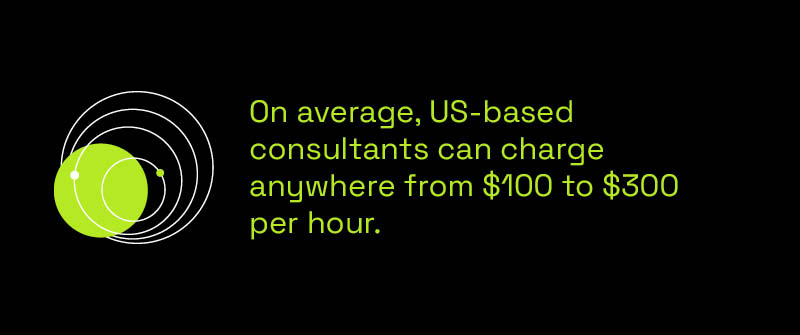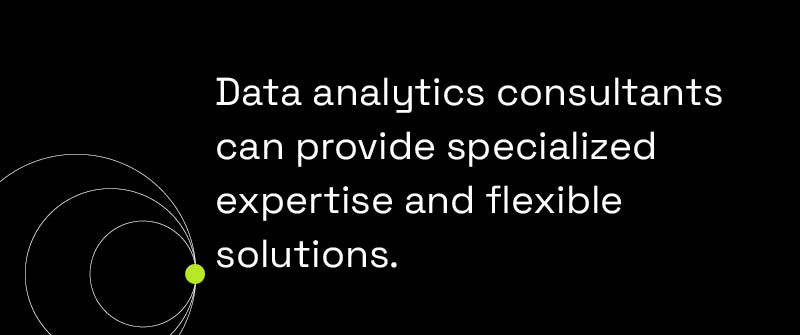
Data analytics consultant costs can vary significantly depending on several factors, and understanding these data analytics costs is imperative for strategic decision-making. By leveraging Business Intelligence Consulting Services, companies can gain clarity on these costs while optimizing their data strategies to achieve a competitive advantage. Understanding these costs becomes imperative for strategic decision-making.
Overview of Factors Influencing Data Analytics Consultant Rates
Several key factors determine the data analytics consultant’s cost, including the complexity and scope of the project, the level of expertise needed, the geographic location, and the consultant’s reputation and track record. For instance, projects requiring specialized knowledge, advanced analytical techniques, or specific analytics tools generally command higher fees. Effective data analysis is crucial for deriving valuable insights, and the costs associated with it can vary based on the complexity and scope of the project. Moreover, consultants with a proven track record of delivering impactful results often charge premiums for their services.
Comparison of Costs Across Regions, Focusing on the USA
Geography plays a crucial role in determining consultant fees. In the USA, the cost tends to be higher compared to other regions due to the demand for high-level analytical skills and the regional cost of living. In the USA, the cost tends to be higher, especially when hiring consulting firms, which can charge significantly more due to their comprehensive services and established reputations. On average, US-based consultants can charge anywhere from $100 to $300 per hour. In comparison, consultants in other countries might charge lower fees, reflecting different economic conditions and market factors.

Difference Between Hiring In-House vs. Freelance Consultants
Businesses often grapple with the decision between hiring an in-house team or a freelance data analyst consultant. External consultants can offer specialized expertise and flexibility, but their costs can vary widely based on the project’s requirements and the consultant’s experience. In-house consultants provide ongoing support, facilitate real-time collaboration, and often develop a deeper understanding of the company’s needs. However, they come with additional costs, including benefits, training, and long-term salary commitments. Freelancers offer flexibility and can be a cost-effective solution for short-term projects or specialized tasks, with costs primarily determined by the duration and nature of the project.
How Much Does a Data Analyst Cost?
When considering the cost of hiring a data analyst, it’s important to start by differentiating between entry-level and experienced professionals. An entry-level data analyst often carries a lower hourly rate, generally ranging from $25 to $40 per hour. This figure can vary significantly depending on factors such as location, the complexity of the tasks involved, and the specific industry, especially in big data projects.
More seasoned analysts, on the other hand, can command higher fees. An experienced data analyst, particularly one with specialized skills or domain expertise, may charge between $60 and $150 per hour. These higher rates reflect their ability to tackle complex data challenges and deliver strategic insights that are highly valuable to businesses.
Data science plays a crucial role in addressing complex business problems, and the costs associated with hiring data science consultants can reflect their advanced skills and experience.
Aside from hourly rates, companies may also encounter fixed pricing models. In this setup, data analysts provide a comprehensive quote based on a project’s overall scope and expected outcomes, which can be beneficial for budgeting. However, whether hiring on an hourly basis or for a fixed fee, the complexity of the project can significantly impact pricing. Projects with intricate data models, advanced analytics requirements, or those necessitating bespoke solutions tend to be priced higher due to the additional effort and expertise required, often involving highly skilled data scientists.
Ultimately, businesses must conduct thorough assessments of their specific needs and budgetary constraints to determine the most appropriate pricing model when engaging with data analysts. Understanding these variables ensures that investments in data analytics bring about the desired outcomes strategically and efficiently.
How Much Do Freelance Data Analysts Charge?
Understanding how much freelance data analysts charge is crucial for businesses weighing the option of outsourcing their data analytics services. The expenses associated with hiring freelance data management consulting services can vary widely based on several factors, including market trends, expertise levels, and the type of project being undertaken.
Data analytics consultants can provide specialized expertise and flexible solutions, but their rates can vary widely based on their experience and the specific needs of the project.

Influence of Market Trends on Big Data Consulting Rates
The cost of hiring a freelance data analyst is often influenced by market trends and the demand for data analytics in various industries. As the global business landscape continues to place high importance on data-driven decision-making, the demand for skilled data analysts is at an all-time high. This increased demand inevitably leads to higher rates, especially for those freelancers with a proven track record of delivering valuable insights, including big data consultants.
Freelance data analysts typically charge an hourly rate that can range anywhere from $50 to $300, depending on their expertise and geographical location. Analysts with specialized skills in advanced fields like machine learning or large-scale data integration can command even higher rates, reflecting the premium placed on these complex skill sets. Big data consulting rates can vary significantly based on the consultant’s experience and the specific technology requirements needed for a project.
Comparison of Long-Term vs. Project-Based Freelance Costs
When employing freelancers, businesses need to decide whether a long-term engagement or a project-based hiring model will be more cost-effective. Long-term engagements can offer the benefit of continuity and deeper integration into the company’s operational framework, which can lead to more coherent insights. Hiring a data science consultant for long-term engagements can offer the benefit of continuity and deeper integration into the company’s operational framework, which can lead to more coherent insights. However, this might come at a higher overall expense compared to shorter, project-specific engagements.
On the other hand, project-based freelance work provides flexibility, as businesses only pay for the work done during that specific period. This can be a financially prudent choice if the firm does not require continuous analytics input, making it easier to manage costs without the commitment of full-time analysts.
Advice for Businesses on Managing and Budgeting Analytics Expenses
Businesses aiming to manage and budget for analytics expenses should first clearly define the scope and goals of their data analytics projects. By doing so, they can more accurately estimate the amount of work required, especially when dealing with multiple data sources, and select the appropriate freelance talent accordingly.
Additionally, considering the allocation of a dedicated budget for analytics initiatives can allow for strategic planning. Firms might also consider engaging a range of freelancers with varying levels of expertise to diversify the skills they bring on board, which could lead to more innovative outcomes.
Ultimately, proper budget management for data analytics can be the cornerstone of making informed, strategic decisions, whether engaging in-house teams or external consultants. P3 Adaptive offers the opportunity to leverage high-caliber talent and technology effectively, transforming complex data challenges into actionable insights. By choosing P3 Adaptive, businesses unlock new potential, leading to more confident decision-making and strategic advantage. Contact the P3 Adaptive team today!
Get in touch with a P3 team member